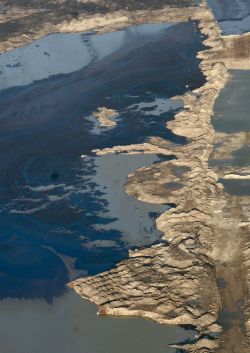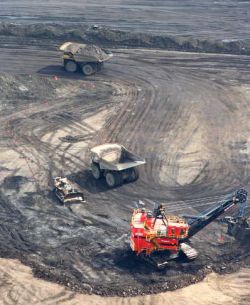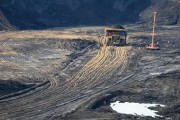Last week we released our report, Toxic Liability, detailing how Albertans could be left on the hook for a $10- to $15-billion cleanup bill for the mess left behind from oilsands mining operations. Understandably, the report drew some attention, but what we're really hoping for is action ... and for that, we're still waiting.
Granted, we were pleased with Alberta Environment's acknowledgement of the problem.
"Do we have enough money in our current security program as a backstop? No. We know we need to have a more robust system in place," said Chris Bourdeau, spokesman for Alberta Environment.
 Bourdeau's statement was encouraging, to be sure, but it's not breaking news. Alberta's Auditor General has drawn attention to the problem four times over the last 11 years. The problem is pretty simple — the government has not collected enough money from oilsands operators to cover cleanup costs.
Bourdeau's statement was encouraging, to be sure, but it's not breaking news. Alberta's Auditor General has drawn attention to the problem four times over the last 11 years. The problem is pretty simple — the government has not collected enough money from oilsands operators to cover cleanup costs.
Oilsands mine operators are required to post what amounts to a damage deposit to the government in case the operator is unable or unwilling to pay to reclaim land that's been disturbed by its mining activities, but based on our conservative estimates, what's been collected falls between $10- and $15-billion short — a liability for Alberta taxpayers.
The Government of Alberta is creating a new policy, but even Mr. Bourdeau holds out little hope it will fix the situation. He says the province wants "to ensure that industry has a system that doesn't necessarily come out and penalize [oilsands operators] quickly by increasing a fund dramatically."
It raises the question: Are oilsands operators' interests being put ahead of the collective interests of Albertans? And if so, why?
This new policy is being developed behind closed doors with industry. In researching Toxic Liability, we spoke with many groups who had been consulted regarding the new policy including Suncor, Shell, Syncrude, the Canadian Association of Petroleum Producers (CAPP), the Oilsands Developers Group, the Alberta Chamber of Resources and numerous other private sector consultants. None of these groups would comment on their involvement with the new mine liability policy.
We even wrote to Alberta Environment Minister Rob Renner, and he declined to comment on the revamped policy or to hear any of the Pembina Institute's concerns.
Stakeholders representing multiple interests should be involved in reworking the policy, such as environmental groups, taxpayers, First Nations and industry.
Industry perspectives on oilsands reclamation aren't representative of all stakeholders, as evidenced in CAPP's response to our report last week:
"As the mining progresses, they pick up a shovel full of material. And when they're finished, they put it back in the same place," said Greg Stringham, vice-president of markets and oilsands for the Canadian Association of Petroleum Producers.
Reclaiming an oilsands mine is, however, much more complex than what CAPP suggests. What kind of feedback on reclamation security has industry been giving the government?
A flawed system that currently favours industry won't be fixed by creating a new system behind closed doors with industry. It also can't be fixed if the Government of Alberta continues to approve additional oilsands projects without having the facts about the projected liabilities before them. French energy giant, Total, currently has an application before the government for an oilsands mine that fails to mention the liabilities that will be created by their project.
It's time to take reclamation security to the next level. The system is broken — let's fix it before approving any new oilsands mines.









